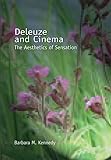Deleuze and Cinema : The Aesthetics of Sensation / Barbara Kennedy.
Material type: TextPublisher: Edinburgh : Edinburgh University Press, [2022]Copyright date: ©2000Description: 1 online resource (240 p.)Content type:
TextPublisher: Edinburgh : Edinburgh University Press, [2022]Copyright date: ©2000Description: 1 online resource (240 p.)Content type: - 9780748611348
- 9780748665914
- online - DeGruyter
- Issued also in print.
| Item type | Current library | Call number | URL | Status | Notes | Barcode | |
|---|---|---|---|---|---|---|---|
 eBook
eBook
|
Biblioteca "Angelicum" Pont. Univ. S.Tommaso d'Aquino Nuvola online | online - DeGruyter (Browse shelf(Opens below)) | Online access | Not for loan (Accesso limitato) | Accesso per gli utenti autorizzati / Access for authorized users | (dgr)9780748665914 |
Frontmatter -- Contents -- Acknowledgements -- Discovering the Beautiful Strange -- From Micro-politics to Aesthetics -- From Oedipal Myths . . . to New Interventions -- From Abstract Machines to Deleuzian Becomings -- Constituting Bodies ± from Subjectivity and Affect to the Becoming-woman of the Cinematic -- Towards an Aesthetics of Sensation -- Orlando - Deleuzian Landscapes of Immanence -- The English Patient - Deleuzian Landscapes of Immanence -- Romeo and Juliet - Deleuzian Sensations -- Strange Days - Deleuzian Sensations -- Reconfiguring Love . . . A Deleuzian Travesty? Leon and a Molecular Politics via the Girl and the Child -- Bibliography -- Filmography -- Index
restricted access online access with authorization star
http://purl.org/coar/access_right/c_16ec
Film theory has for so long been concerned with sociological, empirical and psychoanalytic approaches that its place within our aesthetic sensibilities seems to have been forgotten.Deleuze and Cinema aims to bring back debates about film as an art form - as part of an aesthetic process which incorporates the 'bodies' of our material, technological and molecular worlds. While much film theory has looked at desire in terms of (visual and spectator) pleasure, Barbara Kennedy suggests, in this provocative new study, that these different perceptions of 'body' are responsible, as well as the brain/mind, for the ways in which visual elements of colour, movement, rhythm and sensation are acquired within, through and beyond our consciousness.Film is visceral, vital and dynamic, and wider frameworks of understanding are needed to explain these aesthetic resonances. Deleuze and Cinema asks: how can we begin to understand the cinematic experience as one of material capture, processuality and movement - as opposed to a spectator/text relationship - where desire and pleasure are part of a complex 'aesthetics of sensation'?Through discussions of Orlando, The English Patient, Romeo and Juliet, Strange Days and Leon the book offers a new and creative collusion between Deleuzian philosophy - specifically Deleuze's ideas about desire, pleasure, sensation, affect and 'becoming-woman' - and contemporary film studies.
Issued also in print.
Mode of access: Internet via World Wide Web.
In English.
Description based on online resource; title from PDF title page (publisher's Web site, viewed 02. Mrz 2022)


